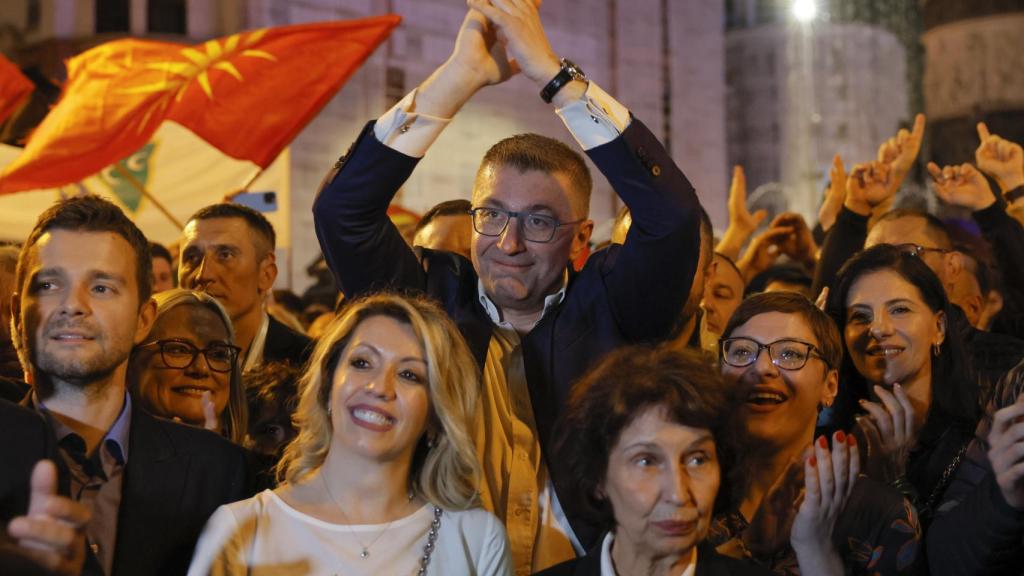This week, North Macedonia has taken a turn to the right: the Balkan country has opted for the end of the social democratic government and five years of nationalism, distancing from the European Union and more tensions with neighboring Bulgaria and Greece. On Wednesday, Macedonians spoke clearly in the parliamentary and presidential elections. Voters entrusted the nationalist VMRO-DPMNE party with 58 of the 120 seats in Parliament, and promoted Gordana Siljanovska-Davkova as the first female president with 65.14% of the support.
“I wondered why he deserved such an honor,” Siljanovska-Davkova reacted on Wednesday night in Skopje, after defeating the current Social Democratic president, Stevo Pendarovski. “The reward is priceless to me, it’s a huge responsibility,” she said. He VMRO-DPMNE He was in power until 2017 before being removed for alleged corruption. His then leader fled from justice to Hungary Viktor Orbánwho promises to be a great ally of the new Government and has shown joy at the victory. Hristijan Mickoskicurrent leader of the party, has promised five years of “justice and responsibility”.
In Parliament, the VMRO-DPMNE of Mickoski and Siljanovska-Davkova will need partners to form a Government. The 62 seats that the party did not get in the Assembly will be distributed between the social democrats of the SDSM – big losers of the elections, with 18 deputies -, the Albanian minority – 32 – and two left-wing parties that take 6 seats each. The albanianswho make up 24.3% of the population, have been part of most coalition governments since the founding of the Norma-cedonian state in 1991. They are divided between the Democratic Union for Integration (DUI)—a member of the outgoing coalition , with 19 seats—and the Vren nationalists, who will have 13 deputies.

President-elect Gordana Siljanovska Davkova celebrates the victory with members of her party.
According to what he told Efe political commentator Isen Saliu on Thursday, the VMRO-DPMNE seeks a coalition with Vren. The Albanians in the opposition “will not have as much room for maneuver to ask for a large number of portfolios” as the DUI, which headed important ministries during the socialist government. In fact, the country’s current prime minister, Talat Xhaferi, is a member of this pro-Albanian minority party.
EU, yes; Bulgaria and Greece, no
North Macedonia is since 2005 EU candidate. The European ambition of its population has turned into frustration in the last 19 years: the slow progress of its accession has despaired of many in the country, which did manage to enter NATO in 2020 – in fact, in 2001, the military Alliance brought North Macedonia back from the brink of civil war during an ethnic Albanian insurgency.
[Macedonia del Norte inicia las negociaciones para entrar en la UE tras 17 años de espera]
Over the last two decades, the Brussels horizon has brought impediments that are today priority problems for Skopje. These come from within the EU: specifically, from its neighbors Bulgaria and Greece. In 2005, Athens blocked accession negotiations due to a conflict over the country’s name — which was resolved in 2018 with the Prespa agreementwhich established that the Former Yugoslav Republic of Macedonia was renamed Macedonia with the surname ‘Northern’.
Now, it is Bulgaria that has been preventing progress for two years due to a dispute over the status of the Bulgarian minority. Sofia demands that Skopje amend its constitutional preamble to mention and recognize the bulgarian minority, which currently make up 3,000 people. The socialist government of the SDSM accepted this condition, but failed to gain a two-thirds majority in Parliament due to the rejection of the nationalists, who demand guarantees that Bulgaria does not impose new blockades in the future.
[Macedonia del Norte y Grecia resucitan sus problemas políticos en plena Eurocopa]
Everything indicates that the VMRO-DPMNE will distance Skopje from the demands of Sofia and Athens. The party that will govern the country for the next five years refuses to use ‘from North’ when referring to his Macedonia. This, in fact, has been one of his great political proclamations during the campaign and a source of criticism against the SDSM. At his celebration Wednesday night, Mickoski demonstrated in his speech his refusal to accept the official name of the country: “Dear people of Macedonia [del Norte]… we did it. Macedonia [del Norte] has won. “It is a historic victory for our people.”
The discursive drift of North Macedonia’s new leaders could unearth the dispute with Greece, where the historical region of Macedonia exists. In addition to the blockade of its neighboring countries, the inability to promote reforms economic and judicial has kept Skopje outside the EU all these years.







